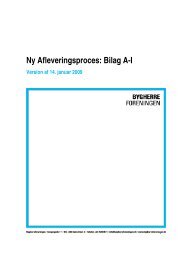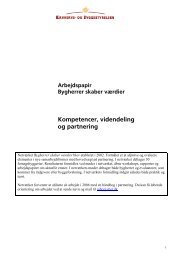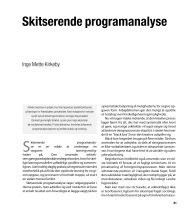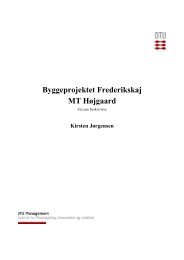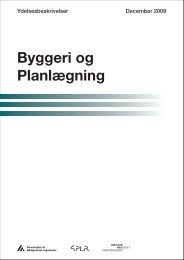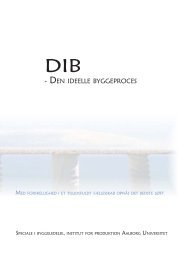Udvælgelses- dan og tildelingskriter ske byggesektor ... - RenProces
Udvælgelses- dan og tildelingskriter ske byggesektor ... - RenProces
Udvælgelses- dan og tildelingskriter ske byggesektor ... - RenProces
Create successful ePaper yourself
Turn your PDF publications into a flip-book with our unique Google optimized e-Paper software.
How the requests from the European Union can be ensure cannot be answered. But for sure the<br />
rules are an effort on finding a solution accepted by all the member states. For some states the<br />
rules seem bureaucratic and controlling and for others quite moderate dependent on which<br />
country and region a participant in a project is coming from. Inside the European Union there is<br />
a big difference in how much faith we have in other fellow human beings. Thus there is a<br />
difference in moral and ethics for participants in a project (Svendsen, G.T., Svendsen, G.L.H.,<br />
2006).<br />
A different shown in the studies is that the more welfare in a population the bigger faith we have<br />
in other fellow human beings and the better moral and ethics will appear. (Svendsen, G.T.,<br />
Svendsen, G.L.H., 2006)<br />
The EU-directives are an attempt to make a common denominator accepted by all the member<br />
states. The rules are developed in 1993 and regularly revised. The financial situation and<br />
welfare of the individual countries have also changed to the better, especially for the poorest of<br />
the countries (Statistics Denmark, 2005). This information compared with an expectation about<br />
a bigger faith in the collaborators in a project, thus moral and ethics should raise, with the result<br />
that the parties do not work against each other but instead a win-win situation arise.<br />
The previous information can maybe lead to changes in the EU-directives. As the rules are<br />
construed now, it is not very easy to make assignment criteria as personal skills, personal<br />
qualities and cooperating measurable and unambiguous in a way so the criteria are accepted by<br />
the court. In Denmark court decisions from The Danish Board of Complaints on Tendering<br />
show that using other criteria than the lowest price are difficult, and there is a need for making<br />
measurable and unambiguous criteria (Ussing, L.F., 2008).<br />
In the longer run the EU-directives have to follow the requests of the clients. It can be as in case<br />
of the little heating plant were the requests from the client were cooperating in a good way:<br />
capability of team work, making a win-win situation and special personal skills and qualities. If<br />
these sorts of requests are dominating, the EU-directives must be adjusted to make it possible in<br />
an easy way to use such criteria without ending up in court.<br />
A way could be to use key performance indicators as assignment criteria. But if the key<br />
performance indicators shall be applicable and impartial, the indicators have to be compiled by<br />
a non-partisan organisation, so it can be assumed that the indicators are reliable, unambiguous<br />
and objective. At this time of key performance indicators do not exist. The indicators from<br />
KPIzone have the right depth as well as the width, but they are made by the companies<br />
themselves and therefore not impartial. The Danish key performance indicators made by The<br />
Benchmark Centre for the Danish Construction sector are impartial, but they do not have the<br />
right depth as well as width yet. If the future can bring a combination of the English and the<br />
Danish system there is a chance to get an applicable system.<br />
In the long term it can be desirable to have EU-directives which in a way so even the public<br />
clients and the private clients are able to use and want to use the directives, also when they do<br />
232



